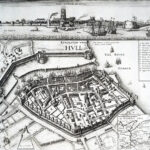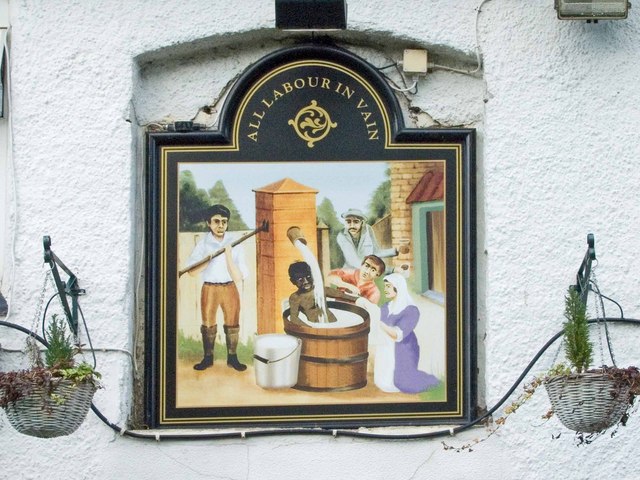17 July 1815: John Dunhill and William Bewell stand trial for their lives shortly after Waterloo, accused of the riotous demolition of a press-gang pub at 41, Humber Street, Hull
Hull Packet. 1815/07/18. Riot [Yorkshire Lammas Assizes]. Hull. Get it:
.Unedited excerpt
If an excerpt is used in the book, it will be shorter, edited and, where applicable, translated.
John Dunhill and William Bewell were charged with riotously assembling, together with a great number of other persons, at Kingston-upon-Hull, and demolishing a certain dwelling-house there situate: another count in the indictment charged them with only beginning to demolish the said dwelling-house.
Mr Park stated, that this was a prosecution instigated by the Lords of the Admiralty, for the protection of the impress service, which, he said, was absolutely necessary for the security of the kingdom. On the 24th of May, an impress gang, stationed at Hull, impressed a seaman near the dock, and he, as was natural, made all resistance he was able, but was overcome; and as he refused to walk, they were under the necessity of carrying him. His cries for assistance soon assembled a great number of persons, who attacked the gang, overcame them, and rescued the person they had impressed. But this was not the whole – a great number of persons soon afterwards assembled in front of the house where the gang rendezvoused, and soon proceeeded to acts of violence, the result of which was, the entire demolition of the house; not only window frames and doors, but the wall of the house. The furniture of the house was also taken out and destroyed, and damage to a very considerable amount was done. There could therefore be no doubt that this was a demolition of the house within the meaning of the law, and all persons who were present at, aiding and abetting by their countenance and approbation, this outrage, were guilty of the offence imputed by this indictment, though they should themselves have taken no part in the demolition of it. The offence was a capital one, and it would have been equally penal if there should only have been a beginning to demolish some substantial part of the building. Mr Park then proceeded to state the circumstances by which he proposed to bring home the charge against the prisoners, to establish which he called the following witnesses.
William Wade West, a lieutenant in the impress service, after detailing some circumstances relative to the commencement of the riot and the attack made upon the captain and himself, stated that he saw the prisoner, John Dunhill, at the door of the house of Matthew Smith, where the impress party had retreated; he was quarrelling with and abusing Smith, in which he was cheered and encouraged by a number of boys; at this time there was a great concourse of people assembled, who appeared very riotously disposed. Witness had gone to the garrison to procure military assistance, but could not obtain it. It was on his return he saw the prisoner. Witness desired Smith to come into the house and lock the door, and he saw no more of the prisoner. Witness then proceeded to state the violence of the mob, who first threw lime, then brick bars and paving stones in at the windows, and at length proceeded to batter down the wall of the house. Witness, against whom the mob imprecated vengeance, made his escape from the back part of the dwelling into another house, and from thence got away.
Matthew Smith stated, that his house was the house of rendezvous for the persons employed on the impress service. He said that the prisoner Dunhill abused him because he would not let him have some ale, which he refused from the prisoner being much intoxicated; he saw him no more after he had shut the door. Witness said he saw the other prisoner, William Bewell, in the mob at six o’clock; he was shouting and making a great noise; he also saw him at nine o’clock, when the demolition of the house had commenced; he was then in the centre of the house, among the mob, shouting and cheering them on. This witness said, his plate and furniture were taken away or destroyed, and he thought the loss could not be less than from four to five hundred pounds; he also stated a number of circumstances relative to the demolition of the house.
Mrs Smith confirmed the account of her husband as to the prisoner Dunhill.
Mr Cosack, merchant, at Hull, stated, that he saw a person whom he thought was the prisoner, Bewell, at the front of Smith’s house, about half past eleven at night. Witness said he seemed to enjoy the scene very much, and was dancing and capering about; he had a piece of timber in his hand, but where he got it he could not state.
Captain [Richard Gaire] Janvrin was examined, but he did not relate any circumstance which tended to fix either of the prisoners with being present.
It is not necessary to enter into the details respecting the defence of Dunhill (who alleged that he had left the spot before the demolition commenced) because no attempt was made to prove that he was present when the demolition of the house was begun. The defence of William Bewelll consisted in setting up an alibi, or showing that he was in another place from five o’clock in the afternoon until near half past eleven o’clock at night, when he was unquestionably there, but this was after all the mischief had been done.
His Lordship said, of the existence of the riot (and a more outrageous and disgraceful one never occurred) and consequent demolition of the house, there could be no doubt; the question for the jury to consider was, whether satisfactory evidence had been given, that both or either of the prisoners were present during the demolition of the house; because if they were present, they must be considered as aiding and abetting in it. But he thought the evidence with respect to Dunhill was extremely slight; and that which respected Bewell had been opposed by evidence which, if the Jury believed, completely destroyed that offered on the part of the prosecution.
The Jury retired for about a quarter of an hour, and on their return into court, found both the prisoners not guilty.
Comment
Comment
I love Luke Clennell’s Press-gang, but can’t find a high-res file:
The Packet said in the immediate aftermath that John Dunning (sic) was a fisherman and William Bewell a country labourer come to Hull to look for work, that the mob drank the ale and spirits, that magistrates and soldiers turned up, and that the Riot Act was read (Hull Packet 1815/05/30).
Given what I think was increasing anti-capital feeling and resentment against the press gangs, would the jury have convicted even if presented with two more obviously guilty defendants? Were Dunhill and Bewell chosen precisely because the evidence against them was weak – a prosecution designed to soothe hurt feelings at the Admiralty without enraging the Hull mob?
Where did the press gang drink after this? The Labour in Vain! Establishing the address of Matthew Smith’s house, T. Tindall Wildridge writes of a nearby inn
now known as “Tiger No. 6.” This inn has only borne that name for some five or six years, having been previously, from the time of the opening of the South Bridge (1866) called the “New Bridge Inn.” Before that it was named “The Labour in Vain,” having as its sign a representation of a negro being scrubbed, in the futile attempt to render him white. Under this title the inn was the rendezvous of the Press-gangs (which gave Hull so much trouble in the beginning of the present century), after the wrecking of the rendezvous, No. 41, Humber-street, by an indignant mob, in July, 1815 (Wildridge 1884).
Wildridge’s ancient house at the ancient entrance into Hull was at 47 and later 47 and 48 Humber Street. The Labour in Vain > The New Bridge Inn > Tiger No. 6 was at 46. All of this is long gone, thanks presumably mainly to the Germans and/or the planners.
A persisting Georgian pub reference to black people in Hull is Ye Olde Black Boy on the High Street, though the interior is 1920s. But let us turn to more substantial matters.
The Labour in Vain
This curious pub name has at least two proto-ancestors to its generalisation in Renaissance Europe. One is Jeremiah 13:23:
Can the Ethiopian change his skin, or the leopard his spots? then may ye also do good, that are accustomed to do evil.
That might be taken as being anti-black, but the potential stigmatisation of dark skin tone isn’t present in Aesop, who one might see as stereotyping white naivety, particularly given the Early Modern suspicion that he was himself of African ancestry:
A shallow ‘squire, who had a negro bought,
His sooty face too long neglected thought;
And, in great hope to make him white and fair,
Had him well scoured with wondrous pains and care:
But spent his labour, soap, and time, in vain;
The native black, did still a black remain.
(Aesop 1708)
There seems to have been a 19th century fashion for calling pubs Labour in Vain and hanging a now verboten sign. And, as with blackface folk dance teams like the Britannia Coconut Dancers of Bacup, various explanations are now offered. Take the one in Westergate, West Sussex:
Pub regulars and residents strongly opposed Wilson’s move, denying the sign was racist in any way. The double-sided sign shows a white woman scrubbing a little black boy in a tub. One side shows her rubbing away enthusiastically. The other side has her still washing the boy but scratching her head in frustration that he is still black. The paintings are based on an apparent true story of a couple who lived there when it was a private house, and before it became a pub. They went to the West Indies but the wife returned to England before her husband and gave birth to a black baby. She scrubbed and scrubbed, hoping against hope that the baby boy would turn white before her husband returned.
Unfortunately no images are available for use here. Photographer Mike White has heard, or believes, that the figures at Telford are “miners … scrubbing away in vain”:
Yarnfield, Staffordshire:
Someone somewhere will surely be glad that all these pubs, and the Renaissance, are gone.
Something to say? Get in touch
Similar
 28 November 1796: The Royal Navy seeks recruits among the seamen of Sculcoates, Cottingham and Little Weighton (ER)
28 November 1796: The Royal Navy seeks recruits among the seamen of Sculcoates, Cottingham and Little Weighton (ER) 17 August 1778: Civil engineers John Smeaton and John Wooler explain how to use the River Hull to flush the dock which has replaced the northwest section of the city walls
17 August 1778: Civil engineers John Smeaton and John Wooler explain how to use the River Hull to flush the dock which has replaced the northwest section of the city walls 27 July 1612: Jennet Preston, the only Yorkshirewoman among the Pendle witches, is found guilty at York of the murder of Thomas Lister of Westby Hall, Gisburn (Ribble Valley)
27 July 1612: Jennet Preston, the only Yorkshirewoman among the Pendle witches, is found guilty at York of the murder of Thomas Lister of Westby Hall, Gisburn (Ribble Valley)
Comment
Comment
Something to say? Get in touch
Search
Donate
Music & books
Place-People-Play: Childcare (and the Kazookestra) on the Headingley/Weetwood borders next to Meanwood Park.
Music from and about Yorkshire by Leeds's Singing Organ-Grinder.





 Bluesky
Bluesky Extwitter
Extwitter